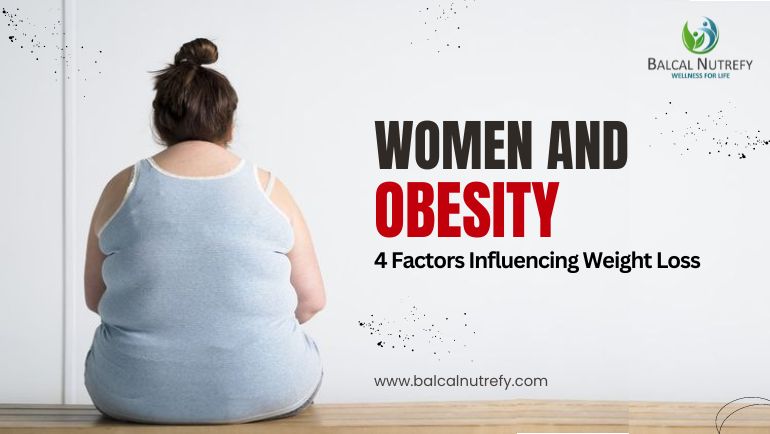In today’s world, Obesity has become a global issue across individuals of all ages, genders, and backgrounds. The most apparent symptom of obesity is a significant and sustained increase in body weight, often leading to a Body Mass Index (BMI) of 30 or higher. Women with obesity may experience a specific pattern of fat distribution around the abdomen, hips, and thighs.
Weight management for women is crucial for their overall health and well-being and not due to social pressure. A woman has to balance various roles such as being a mother, caregiver, or working professional, and with all these responsibilities she doesn’t give priority to her health. Maintaining a healthy weight is associated with a lower risk of chronic diseases such as heart disease, diabetes, and certain types of cancer. In women, obesity symptoms and causes are influenced by a range of factors, including genetics, lifestyle, hormonal fluctuations, and overall health. This blog aims to throw light on multiple aspects of women with obesity.
There are four essential pillars of health – Diet, Exercise, Stress, and Sleep. These are like the four wheels of a car that help the car reach the destination. If one of the wheels is not working, the destination will be unreachable. Similarly, we have to give importance to all four factors when it comes to obesity and women’s health. Let’s understand the causes one by one.
1. Quality Sleep
Sufficient sleep is essential to maintain a healthy physical and emotional well-being. It is not just a break from the day, it is also a vital component of our health. The hormones that regulate hunger and satiety are influenced by sleep. Insufficient or poor quality sleep disrupts the balance of Ghrelin and Leptin – hormones that control appetite. This hormonal imbalance often leads to increased cravings and overeating, especially craving for high-calorie snacks in the evening. Acute total sleep deprivation shifts the endocrine balance from the satiety hormone leptin toward the hunger-promoting hormone ghrelin which leads to weight gain. Factors such as hormonal changes, stress, depression and age affect your sleep. Overall better sleep health was associated with greater fat loss.
2. Stress & Emotional Eating
Stress is the body’s reaction to a particular event. Everyone experiences stress. Women exposed to stress for long experience various health issues, and one of them is increased weight.
Studies have shown that chronic stress levels tend to engage in emotional eating. The prevalence of emotional eating tendency in response to positive or negative emotions is higher in women than men. Chronic stress increases cortisol levels, increasing blood pressure and Insulin production, suppressing your immune system. As your insulin levels go up, your blood sugar drops, making you crave for fatty and sugary foods. Stress eating is a common response and often involves reaching for high-calorie, sugary snacks. These choices can contribute to weight gain over time.
Stress can lead to insomnia or impact the quality and quantity of sleep, disrupting the balance of hormones responsible for hunger and potentially leading to weight gain.
3. Hormonal Factors
Following are the six hormones that play an important role in women’s lives when it comes to weight loss
- Insulin: When you’re overweight or have a high-fat percentage, your body can develop insulin resistance. In this case, your liver converts the glucose into fat instead of utilizing the extra glucose from the food in the cell.
- Estrogen: Estrogens play a crucial role in body weight, fat distribution, energy expenditure, and metabolism. Deficiency of estrogen can cause weight gain and insulin resistance. Fluctuations in estrogen levels, such as during the menstrual cycle or menopause, can influence appetite, cravings, and where our bodies store fat. It is one reason why women might gain weight around menopause
- Cortisol: Cortisol is known as the stress hormone. Excess cortisol secretion can cause excessive weight gain and medical conditions like diabetes, heart disease, irregular menses, and infertility.
- Leptin: Leptin is your body’s appetite suppressant. It is what stops you from eating and signals that your body is full. Leptin levels increase with increasing body fat. However, they also do not work properly due to leptin resistance. Leptin doesn’t work properly and disturbs the hunger and satiety mechanism.
- Progesterone: Progesterone, another key reproductive hormone, can impact our weight by influencing water retention and body temperature. Progesterone levels change throughout the menstrual cycle and bring weight gain
- Thyroid hormones: They regulate your body’s metabolism. It controls your body’s metabolism, body temperature, and appetite regulation. An underactive thyroid (hypothyroidism) can slow down metabolism, making it more challenging to maintain a healthy weight.
4. Age
As we age, our bodies undergo various changes, including shifts in metabolism, hormonal fluctuations, and changes in body composition. As you get older, Metabolism tends to slow down and you lose muscle mass. This means we burn fewer calories at rest. As a result, the excess calories may be stored as fat, particularly around the abdomen, which is commonly associated with ageing.
Many researches have shown that on average, women aged between 45 and 55 years gain around half a kilo per year. After menopause, levels of estrogen reduce which can cause fat to be stored around your waist rather than on your hips and thighs. Postmenopausal women account for belly fat around 15 to 20% of their total body weight, compared with 5 to 8% in premenopausal women.
It’s important to note that the emphasis should be on adopting a holistic and sustainable approach to Obesity management, focusing on overall health rather than solely on the number on the scale. Recognizing the symptoms and understanding the causes are crucial steps in addressing obesity prevention.
Diet and regular exercise are the key components for obesity prevention in women but it is important to pay attention to other causes of Obesity as well such as embracing hormonal changes, adequate hydration, sleep management, and emotional well-being. Adopting a balanced diet, staying physically active, and incorporating strength training into our routines can help preserve muscle mass, boost metabolism, and manage fat deposition more effectively.
Remember, it’s never too late to adopt healthy habits and make positive changes.
If you want to get started on your wellness journey please feel free to reach out by filling out the contact form on our website. We look forward to assist you on your wellness journey to better health and sustainable lifestyle.
Follow us on: Instagram, Facebook, LinkedIn and Stay Tuned for more such insightful & informational blogs & videos along with some delicious & healthy recipes.




